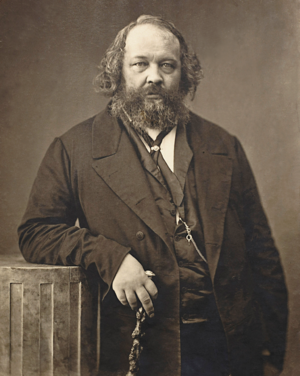Mikhail Bakunin
This article may contain content lifted from Wikipedia. You can help by adapting it for Leftypedia by adding more sources or properly attributing the information on this page. (February 2024) |
Mikhail Bakunin | |
|---|---|
 | |
| Born |
Mikhail Alexandrovich Bakunin 30 May 1814 (N.S.) Pryamukhino, Tver Governorate, Russian Empire (present-day Kuvshinovsky District, Tver Oblast, Russian Federation) |
| Died |
1 July 1876 (aged 62) Bern, Switzerland |
| Family | Bakunin noble family |
| Part of a series on |
| Anarchism |
|---|
|
"That we are utopians is well known. So utopian are we that we go the length of believing that the revolution can and ought to assure shelter, food, and clothes to all" |
| Variants |
| Communist · Syndicalist · Individualist (Egoist) · Collectivist · Ecological (Primitivist) · Mutualist · Feminist · Black · Pacifist · Transhumanist · Queer · Religious · Post-left · Without Adjectives |
| People |
| Bakunin · Bookchin · Chomsky · Durruti · Goldman · Godwin · Graeber · Shūsui · Kropotkin · Landauer · Makhno · Proudhon · Stirner · Tolstoy · Zerzan |
| Tactics and methods |
| Autonomous zones · Black bloc · Mutual aid · Communes · Anti-fascism · Direct action · General strike · Workplace cooperatives · Hacktivism · Squatting · Direct democracy · Illegalism · Insurrection |
Mikhail Alexandrovich Bakunin (30 May 1814 – 1 July 1876) was a Russian revolutionary anarchist and political author whose writings are some of the most important to modern anarchism and anarcho-communism.
Bakunin lived in Paris in the 1840s, where he met, and was influenced by, both Karl Marx and Pierre-Joseph Proudhon. However, he was expelled from France for opposing the Russian Empire's occupation of Poland. After participating in the Revolutions of 1848, namely the Prague and Dresden uprisings, Bakunin was imprisoned, tried, sentenced to death, and extradited multiple times. Finally exiled to Siberia in 1857, he escaped via Japan to the United States and then to London, where he worked with Alexander Herzen on the journal Kolokol (The Bell). In 1863, Bakunin left to join the insurrection in Poland, but he failed to reach it and instead spent time in Switzerland and Italy.
In 1868, Bakunin joined the International Workingmen's Association, leading the anarchist faction to rapidly grow in influence. The 1872 Hague Congress was dominated by a struggle between Bakunin and Marx, who was a key figure in the General Council of the International and argued for the use of state power to achieve working class power and a communist society. In contrast, Bakunin's faction argued for the replacement of the state by federations of self-governing workplaces and communes.[citation needed] Bakunin could not reach the Netherlands to attend the confrerence, and the anarchist faction lost the debate in his absence.[citation needed] Bakunin was expelled from the International for maintaining, in Marx's view, a secret organisation within the International,[citation needed] and founded the Anti-Authoritarian International in 1872. From 1870 until his death in 1876, Bakunin wrote his longer works such as Statism and Anarchy and God and the State, but he continued to directly participate in European worker and peasant movements. In 1870, he was involved in an insurrection in Lyon, France. Bakunin sought to take part in an anarchist insurrection in Bologna, Italy, but his declining health forced him to return to Switzerland in disguise.
Bakunin is remembered as a major figure in the history of anarchism, an opponent of Marxism, especially of the dictatorship of the proletariat; and for his predictions that Marxist regimes would be one-party dictatorships ruling over the proletariat, not rule by the proletariat. Anarchists typically consider the USSR and other socialist states to be a fulfillment of his prediction. Bakunin's work God and the State has been widely translated and remains in print. Bakunin has had a significant influence on thinkers such as Peter Kropotkin, Errico Malatesta, who together with Proudhon make up the founding thinkers in anarchist philosophy today.
